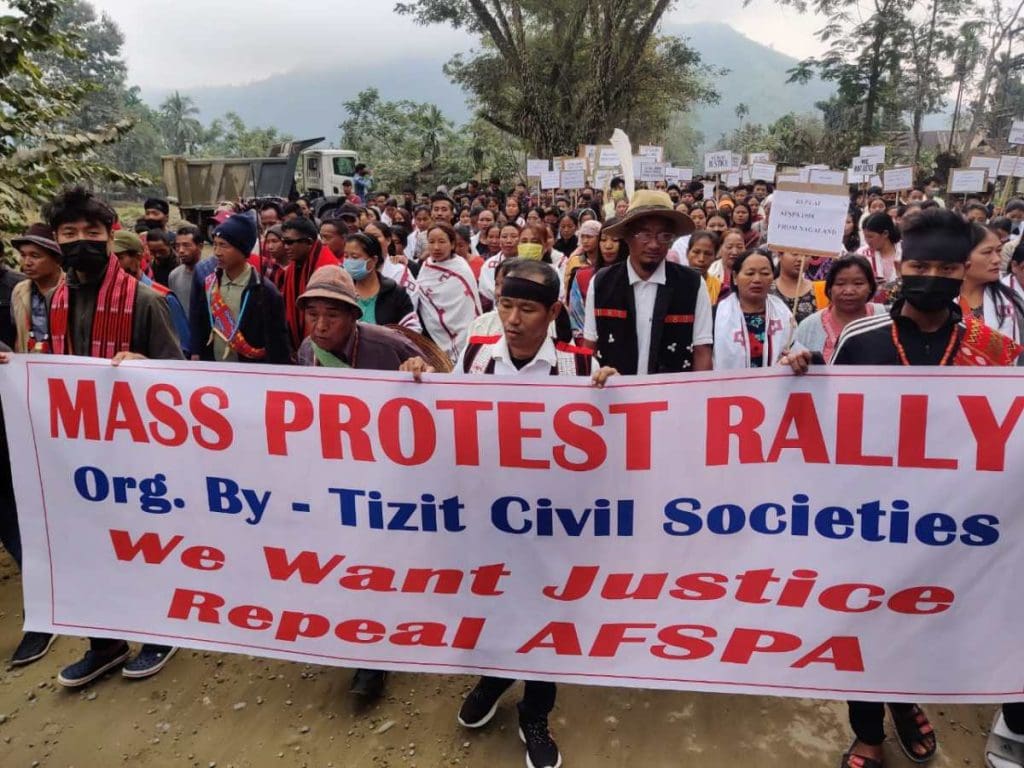
Nearly a month after the cold blood murder of several civilians by Indian Army in Nagaland, the Union government Sunday instituted a high-level committee chaired by a Secretary-level officer to examine the possibility of withdrawing the draconian AFSPA in Nagaland.
The committee will submit its report within 45 days, according to Indian Express.
Registrar General and Census Commissioner of India Vivek Joshi will head the five-member committee and Additional Secretary in the Union Home Ministry Piyush Goyal will be its Member-Secretary. Director General of Police of Nagaland and the DGP of Assam Rifles will be the other panel members.
The decision to set up the committee was taken in a meeting chaired by Union Home Minister Amit Shah on December 23, claimed Nagaland Chief Minister Neiphiu Rio, Deputy CM Yanthungo Patton and Naga People’s Front Legislature Party leader TR Zeliang.
“The committee will submit its report within 45 days and withdrawal of Disturbed Area and AFSPA from Nagaland will be based on the recommendations of the committee,” CM said.
Last week, the Nagaland Assembly unanimously passed a resolution demanding that the Union government withdraws the draconian AFSPA from the North East, and especially from Nagaland.
The AFSPA gives armed forces deployed in internal conflicts broad powers to use lethal force and provides soldiers with effective immunity from prosecution.
Following the killings, the chief ministers of Nagaland and neighboring Meghalaya state, both allied to the Bharatiya Janata Party-led Union government, called for the repeal of AFSPA, as did opposition politicians, human rights activists, and affected residents.
The AFSPA, enacted in 1958 as a short-term measure to allow deployment of the army to counter an armed separatist movement in the Naga Hills, has now been in force for over 60 years. In addition to Nagaland, it is currently used in Manipur, Assam, and parts of Arunachal Pradesh and Jammu and Kashmir.
The AFSPA gives the armed forces wide powers to shoot to kill, make arrests on flimsy pretexts, conduct warrantless searches, and demolish structures in the name of “aiding civil power,” Human Rights Watch said.
The powers that the law extends to the armed forces come into force once an area subject to the act has been declared “disturbed” by the Union or state government. This declaration is not subject to judicial review.
Several reports of human rights groups found that equipped with these special powers, soldiers have raped, tortured, forcibly disappeared, and killed people without fear of being held accountable in these regions.
The act violates international human rights law protections, including the right to life, the right to be protected from arbitrary arrest and detention, and the right to be free from torture and cruel, inhuman, or degrading treatment. It also denies the victims and their families the right to a remedy.
Several government-appointed commissions in India have recommended repealing the law. Several United Nations human rights bodies have also called for the repeal of the law. A 2019 report on Jammu and Kashmir by the Office of the United Nations High Commissioner for Human Rights noted that the AFSPA “remains a key obstacle to accountability.”



